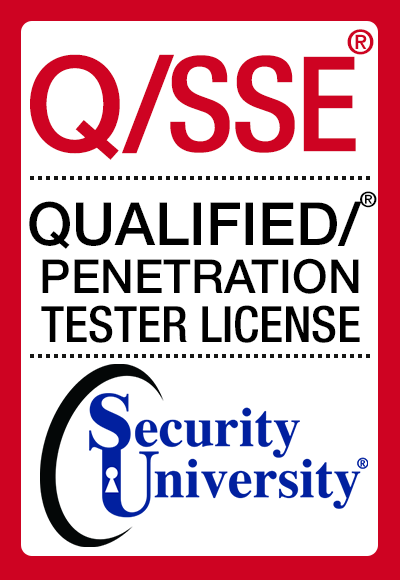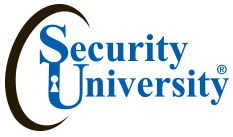SU Q/SSE® Qualified/ Software Security Expert Certificate Program of Mastery
Class fee include all Required classed – exams are required to graduate
 Everyone, no matter what software you write, software protocols, internal processes or you're responsible for secure programming. You all need to know secure coding techniques that minimize the adverse effects of SQL or other malicious hacker attacks on code.
Everyone, no matter what software you write, software protocols, internal processes or you're responsible for secure programming. You all need to know secure coding techniques that minimize the adverse effects of SQL or other malicious hacker attacks on code.
This class is for everyone! If you want to learn how add Microsoft's SDL, sanitize inputs and test code this class is for you, if you write code this class is for you because everyone needs to know software security and how to BREAK & FIX software.
This SU Certificate Program of Mastery delivers the best of all of the Qualified Software Security Expert classes and more. It includes items that are defensive in nature (e.g. checking error return codes before using, other data structures that should have been created, or protecting against using a pointer after it has been released), process-related and risk- related, hacking and XSS . Also included are items on how to prevent attacks with a step-by-step process how to FIX software with counter measures that protect your code.
Passing the Q/SSE classes qualifies you to take each Q/SSE exam. The Q/SSE exam is made up questions you have seen from the Q/SSE classes that you take before the Q/SEE 100 multiple choice EXAM. Or you can Master the Q/SSE EXAM without taking any Q/SSE classes by passing the Q/SSE exam with an 70 or better and prove you have mastered the tactical software security skills labs from each Q/SEE class that proves your "qualified" for the job.
Lastly, its all about the web killer app. Web servers ARE the target of choice for hackers. 97% of all web applications are vulnerable, and better network security isn't the only answer! We explore a model for web application testing and discuss web application concerns, including accountability, availability, confidentiality and integrity. You will go well beyond the OWASP to look at 19 specific web application attacks, including attacking the client, state, data and the server. When you leave these classes you are ready to defend your c0d3!
The SU Q/SSE® Certificate Program of Mastery and related secure coding micro badges identify and certify "qualified persons" who subscribe to a rigorous requirement to maintain their knowledge and proficiency securing code. The mission is to know secure coding techniques that minimize the adverse effects of SQL or other malicious hacker attacks on code.
CISSP® is a registered trademark of {ISC)2® -SU CISSP Training classes are not endorsed or sponsored by {ISC)2® /CEH® CHFI® are EC Council registered trademarks SU CWNA / CWSP classes are not endorsed or sponsored by CWNP® /SU CIPP® Training classes are not endorsed or sponsored by IAPP® /R is a required E is an elective. Practical required CPoM designation "validation" after class completion. Practicals are mastery evidence to support the claim of knowing something. CISSP class excludes exam fee.
SU Accelerated Qualified/ Registered Cyber Apprenticeship Program. 100% eligible for veteran education benefits. Earn 8 Cyber Certs/ 24 mo/ attend 8 courses of hands-on classes/ Employer agreement and Apprenticeship agreement required for apprenticeship program.
Advance your cyber career skills at SU. SU Testing {SUT) owns Q/ISP® ,, Q/IAP®, Q/WP®, Q/SSE® , Q/CND® Certificate Program of Mastery
All Students are required to register online at the SU website REGISTER ME Tab {https://www.securityuniversity.net/reg.php).
NONSTANDARD TERM DEFENITION AND PRIOR CREDIT WAIVER
A term that is shorter or longer than a standard quarter or semester. The number of instructor-student contact hours is increased proportionately each week to compensate for the difference in length. All courses are 72 contact hours of face to face 40 hours instruction with pre study or post class practicums of 32 hours [veterans using the VA ED benefits can only attend face to-face modality] Prior credit (PC) waiver subsume pre-class hours.
ADMISSIONS REQUIREMENTS - SU does not discriminate on the basis of race, color, age, sex, gender, religion, sexual orientation, ethnic origin / national origin, disability, perceived gender, or gender identity in admissions, career services, or any other activities. Applicants will not be denied admission on the basis of any of the foregoing factors, but applicants must meet all requirements specified for admission. A Student must meet the state minimum age requirement to enter school {if applicable) and must submit the following:
- A copy of a valid state or federal issued photo identification
- Has sufficient knowledge of the Transmission Control Protocol/Internet Protocol {TCP/IP). a yes or no answer with school president is sufficient to confirm one's knowledge of TCP/IP.
- Or verified 2 months of work experience or employer enrollment.
- Interview with the school president to confirm the students work history and TCP/IP knowledge.
Or a resume can verify 2 months of work experience using TCP/IP.
- A school transcript or credential validation is requested for prior credit and PC waiver.
STUDENT ADMISSION AND ORIENTATION INFORMATION:
All incoming Students must attend an inperson orientation the morning of the first day of class or program. During orientation student learn about responsibilities and standards, prior credit, attendance , testing & graduation.
Who Should Attend
Software testers, software developers, development and test managers, security auditors and anyone involved in software production for resale or internal use will find it valuable. Information Security and IT managers; Information Assurance Programmers; Information Security Analysts and Consultants; Internal Auditors and Audit Consultants.
What Is CWE?![]()
Targeted to developers and security practitioners, CWE is a formal list of software weaknesses, idiosyncrasies, faults, and flaws created to serve as a common language for describing the source code, software design, or software architecture causes of software security vulnerabilities. CWE is a standard measuring stick for software security tools targeting these issues. That provide a common baseline standard for identification, mitigation, and prevention of these weaknesses.
*Class fees are subject to change



